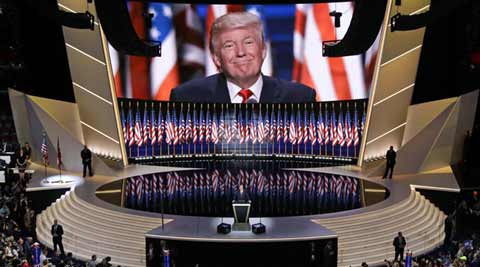Opinion Trump disruption
His divisive agendas have divided the Republican Party and American politics

The just-concluded convention of the Republican Party in Cleveland, Ohio was anything but conventional. The principal purpose of the nominating conventions is to signal party unity by putting aside personal differences and policy arguments that animated the turbulent primary process. But the Cleveland convention will be remembered for the public expression of deep divisions that have cleaved the Republican Party in 2016. And then some. Much of the Republican Party establishment stayed away from Cleveland. Senator Ted Cruz, who came a distant second in the primaries, did show up. But when he refused to endorse Trump and urged the delegates to vote their conscience, he was booed off the stage. With few party stalwarts to rally the troops, Trump chose to serenade the members of his beautiful family. Some of that effect was marred by the discovery that the speeches of his wife Melania and son Donald Jr were plagiarised.
But these distractions don’t overshadow Trump’s reaffirmation of a powerful, and what many see as dangerous, political message that allowed him to outsmart many well-established leaders in the Republican Party over the last few months. If there was one idea that knit together both his campaign and his address at the convention, it was “America First” — keeping Americans safe from crime, Islamic terror, migrant workers, foreign goods and free-riding allies. At the centre of his speech was the self definition as a “law and order candidate” amidst deepening racial tension and widespread attacks on the police in American cities. His stoking of internal security anxieties was matched by his plans to limit the external threat to America: Mexican and Muslim immigration. He blamed free trade for the loss of jobs and promised to tear up or renegotiate trade agreements. On foreign policy he has reaffirmed that the Allies must pay more for American security umbrella.
Trump’s radical agenda would not have mattered if his prospects of winning were trivial. Although the poll numbers continue to favour his Democratic rival Hillary Clinton, there is no pre-judging the outcome in a two horse race. Trump’s claim that “Americanism, not globalism, is his credo” did resonate during the primaries, especially with the White working classes who are threatened by economic globalisation and open borders. By painting Clinton as symbol of a greedy globalist elite that has robbed America of its jobs and created new threats to it by military adventurism in West Asia, Trump hopes to put his powerful rival on the defensive and wean away many traditional Democratic voters. Many have seen Trump’s strategy as reckless. But there is a method in the manic turn that Trump has begun to impose on the Grand Old Party and American politics.





